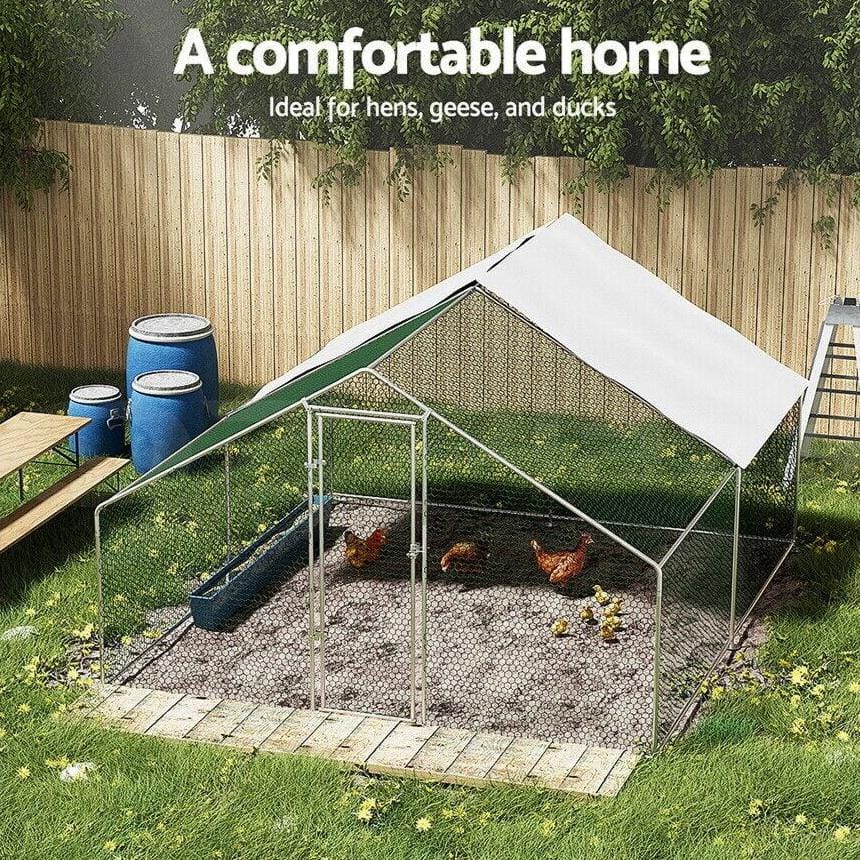Top 10 Chicken Coop Accessories to Keep Your Flock Happy and Healthy

Raising chickens is an increasingly popular hobby, whether for farm-fresh eggs, sustainable living, or as a therapeutic pastime. A well-designed chicken coop outfitted with the right accessories is essential to ensure your flock’s happiness, health, and productivity. Chickens are active, curious creatures with specific needs that go beyond basic food and shelter. In this comprehensive guide, we’ll delve into the top 10 chicken coop accessories that every chicken owner should consider, explaining their benefits, how to use them effectively, and tips for making the most of your investment.
1. Automatic Chicken Door
An auto chicken door is one of the most convenient and valuable accessories you can add to your chicken coop. It takes the hassle out of manually opening and closing the coop each day, ensuring your chickens are protected from predators at night and have access to the outdoors during the day.
Benefits:
- Safety: Automatically closes at dusk, protecting chickens from nocturnal predators like raccoons, foxes, and coyotes.
- Convenience: Eliminates the need for you to be home at sunrise and sunset.
- Energy Efficiency: Many models are solar-powered or battery-operated, minimizing their impact on your energy costs.
Tips:
- Installation: Position the door so that it doesn’t interfere with the chickens’ natural traffic flow.
- Maintenance: Regularly check for dirt buildup or mechanical issues to ensure smooth operation.
An automatic chicken door not only simplifies coop management but also gives you peace of mind knowing your flock is safe.
2. Nesting Boxes
Chicken Nesting boxes are essential for any egg-laying flock. These cozy, private spaces give hens a secure area to lay their eggs and prevent them from scattering eggs around the coop.
Ideal Features:
- Size: Each box should measure approximately 12×12 inches, accommodating hens comfortably.
- Material: Use durable materials like wood or plastic for easy cleaning.
- Placement: Position boxes in a quiet, dark area of the coop to encourage use.
Pro Tips:
- Quantity: Provide one nesting box for every 3-4 hens.
- Comfort: Line the boxes with soft bedding such as straw, shredded paper, or wood shavings to cushion eggs and prevent breakage.
- Hygiene: Regularly clean and replace bedding to prevent mites and other pests.
A well-maintained nesting box system reduces stress in hens and ensures you’ll have clean, unbroken eggs to collect.
3. Perches and Roosting Bars
Chickens naturally roost at night to sleep. Installing sturdy perches or roosting bars in your coop mimics their natural behavior and keeps them comfortable.
Why Perches Matter:
- Health: Roosting keeps chickens off the damp ground, reducing the risk of respiratory issues and frostbite.
- Safety: Elevated perches make chickens feel secure from predators.
Design Tips:
- Height: Place roosting bars at least 18-24 inches off the ground, with a gradual incline for accessibility.
- Spacing: Allow 8-10 inches of perch space per chicken to prevent overcrowding.
- Material: Use rounded wooden dowels or branches to mimic natural perches.
Properly installed perches improve flock dynamics and promote better health and behavior.
4. High-Quality Feeder
Feeding your chickens efficiently is a cornerstone of good flock management. A well-designed automatic chicken feeder prevents waste, keeps pests away, and ensures all your chickens have access to food.
Features to Look For:
- Spill-Proof Design: Gravity-fed or treadle feeders minimize spillage and waste.
- Durability: Choose feeders made of metal or heavy-duty plastic to withstand pecking and weather.
- Capacity: Opt for a feeder large enough to hold at least a day’s worth of feed.
Maintenance:
- Clean feeders weekly to prevent mold or bacteria buildup.
- Place the feeder at chicken height to minimize contamination from dirt or droppings.
A quality feeder keeps your flock well-nourished while reducing mess and feed costs.
5. Automatic Waterer
Clean water is crucial for your chickens’ health. Automatic chicken water feeder ensure a consistent supply of fresh water without the need for constant refilling.
Types of Waterers:
- Nipple Waterers: Prevent spills and keep water clean.
- Cup Waterers: Easy for chickens to access and maintain.
- Gravity-Fed Systems: Simple and reliable, with minimal upkeep.
Placement Tips:
- Keep waterers elevated to prevent contamination from dirt or bedding.
- During winter, use a heated waterer to prevent freezing.
An automatic waterer saves time and ensures your flock stays hydrated, especially during hot weather.
6. Dust Bath Area
Dust bathing is an essential behavior for chickens, allowing them to clean their feathers and control pests naturally. Providing a dedicated dust bath area in or near your coop is vital.
Ideal Dust Bath Ingredients:
- Loose Soil or Sand: Forms the base for easy digging.
- Wood Ash: Helps repel parasites.
- Diatomaceous Earth: Adds an extra layer of protection against mites and lice.
How to Create a Dust Bath:
- Use a shallow container, such as a plastic tub or wooden box, to hold the dust.
- Place it in a sunny, dry location to prevent dampness and mold.
A well-maintained dust bath area keeps your chickens healthy and promotes natural grooming habits.
7. Coop Lighting
Lighting plays a significant role in chicken health and egg production. During shorter winter days, supplemental lighting in the coop can help maintain consistent egg laying.
Best Practices:
- Lighting Type: Use LED bulbs with a soft, warm glow to mimic natural sunlight.
- Timer: Install a timer to ensure lighting is consistent and doesn’t stress the flock.
- Duration: Provide 14-16 hours of light daily to sustain egg production.
Safety Tips:
- Secure wires to prevent pecking.
- Ensure lighting fixtures are weatherproof and resistant to dust.
Thoughtful lighting enhances both the comfort of your chickens and their productivity.
8. Predator-Proof Fencing
Predator attacks can devastate a flock, so strong, reliable fencing is a must. Protecting your coop and run area minimizes the risk of losses.
Materials:
- Hardware Cloth: Offers better protection than traditional chicken wire, which predators can easily tear.
- Electric Fencing: Provides an added deterrent for larger predators like coyotes or bears.
Installation Tips:
- Bury Fencing: Extend the fencing 6-12 inches underground to deter digging predators.
- Secure Gaps: Inspect for and seal any small openings where predators might squeeze through.
Investing in predator-proof fencing ensures your chickens can roam safely without constant worry.
9. Chicken Toys and Enrichment
Chickens are intelligent and curious animals that benefit from mental and physical stimulation. Adding toys and enrichment to the coop prevents boredom and promotes healthy social behavior.
Fun Ideas:
- Treat Dispensers: Use balls or containers that release treats as chickens peck.
- Hanging Greens: Suspend cabbages or lettuce heads for a fun foraging activity.
- Mirrors or Shiny Objects: Chickens love pecking at reflective surfaces.
DIY Options:
- Create a simple swing from rope and a sturdy wooden bar.
- Scatter mealworms in bedding to encourage scratching.
Enrichment not only keeps your chickens entertained but also reduces stress-related behaviors like feather pecking.
10. Ventilation System
Proper ventilation is crucial for maintaining a healthy coop environment. Good airflow reduces moisture buildup and ammonia levels, preventing respiratory issues in your flock.
Key Features:
- Vents: Install adjustable vents or windows for airflow control.
- Mesh Screens: Cover openings with mesh to keep predators and pests out.
- Seasonal Adjustments: Use insulating materials to maintain warmth in winter while allowing air circulation.
Maintenance:
- Regularly check for blockages or damage to ventilation systems.
- Position vents to promote cross-ventilation without creating drafts.
A well-ventilated coop ensures your chickens stay comfortable in all seasons and helps prevent disease.
Bonus Tips for Maintaining a Happy and Healthy Flock
Even with the best accessories, a clean, well-maintained coop is essential. Here are some additional tips for successful flock management:
- Regular Cleaning: Remove droppings and replace bedding weekly to prevent disease.
- Inspect Accessories: Check for wear and tear on feeders, waterers, and perches.
- Seasonal Prep: Winterize your coop with insulation and heated waterers, and provide shade in summer to prevent overheating.
- Diet and Treats: Offer a balanced diet supplemented with occasional treats like mealworms or kitchen scraps.
- Health Monitoring: Watch for signs of illness, such as lethargy or feather loss, and address issues promptly.
Conclusion
Outfitting your chicken coop with the right accessories makes all the difference in keeping your flock happy, healthy, and productive. From essential tools like automatic doors and nesting boxes to enriching additions like toys and dust baths, each accessory serves a purpose in enhancing your chickens’ well-being. By investing in these items and maintaining your coop diligently, you’ll not only enjoy the benefits of fresh eggs but also the satisfaction of a thriving, contented flock.
Frequently Asked Questions About Chicken Coop Accessories
1. What is the most important accessory for a chicken coop?
The most important accessory for a chicken coop depends on your flock’s needs, but essentials include:
- Automatic Chicken Door for predator protection.
- Feeder and Waterer for consistent access to food and water.
- Ventilation System to ensure proper airflow and prevent respiratory issues.
These basics ensure safety, health, and convenience for your chickens and you as their caretaker.
2. How do I keep my chicken coop clean and pest-free?
To maintain cleanliness and prevent pests:
- Clean Weekly: Remove droppings and replace bedding.
- Add a Dust Bath: Mix diatomaceous earth with sand to help chickens repel parasites naturally.
- Inspect Accessories: Regularly clean feeders, waterers, and nesting boxes.
- Use Natural Repellents: Herbs like mint and lavender can deter pests in and around the coop.
3. How can I keep my chickens safe from predators?
Predator-proofing your coop is critical:
- Install hardware cloth instead of chicken wire for better security.
- Use an automatic chicken door that closes at dusk.
- Bury fencing 6-12 inches underground to stop digging predators.
- Secure coop openings with locks or latches to deter raccoons and other smart animals.
4. What do chickens need for winter?
In winter, chickens require:
- Insulation: Ensure the coop is draft-free but well-ventilated to prevent moisture buildup.
- Heated Waterer: Prevents water from freezing.
- Extra Bedding: Add straw or wood shavings for warmth.
- Lighting: Supplemental lighting can help maintain egg production during shorter days.
5. How can I make my chickens happier and more active?
To keep chickens entertained and stress-free:
- Provide toys and enrichment, like treat balls or hanging greens.
- Add perches at different heights for climbing and roosting.
- Create a dust bath area for grooming and pest control.
- Offer occasional treats like mealworms or kitchen scraps to stimulate natural foraging behavior.
Happy chickens are healthy chickens, which leads to better egg production and flock harmony!

Leave a Comment